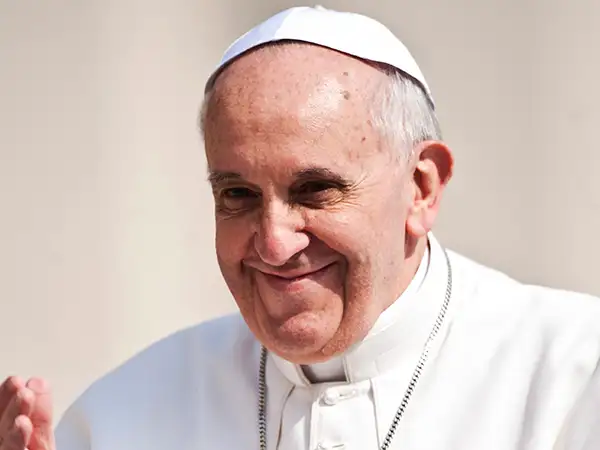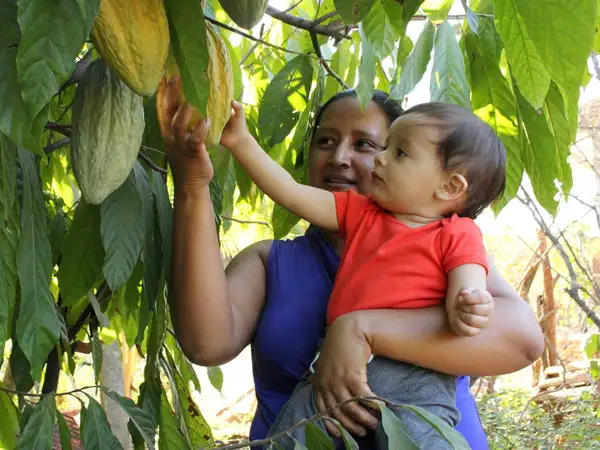Find out what Pope Francis’ third encyclical means for the world we hope to see.
The Vatican released the much-anticipated encyclical by Pope Francis, 'Laudato Si' - Care of our common home', in 2015. This Q&A includes an encyclical definition and a look at what Pope Francis’ encyclical means for the world we hope to see.
What is an encyclical?
An encyclical is a letter circulated by the Pope to Catholic churches worldwide. It is sent directly from our Holy Father in Rome to Catholics all over the world and is often addressed to all people of good will, namely non-Catholics who may also want to read the document. Pope Francis' encyclical 'Laudato Si' - Care of our common home' is addressed to "every person living on this planet".
Papal encyclicals provide analysis, in the light of the Gospel and of the Tradition of the Church, on relevant issues for the faithful. Previous popes have issued encyclicals on a variety of topics, from the study of Scripture (Leo XIII, 1893) to humanity's redemption in Christ and the dignity of human beings (John Paul II, 1979).
From 1891 onwards, many encyclicals were issued as responses to questions raised by social movements and calls for societal change. For example the struggles of workers during the industrial revolution (Leo XIII, 1891), the need for peace in the post-World War II era (John XXIII, 1963) and the global financial crisis (Benedict XVI, 2009). These later encyclicals are part of what is known as Catholic Social Teaching documents.
What kind of encyclical has Pope Francis written?
The encyclical Laudato Si' is considered part of the Catholic Social Teaching tradition. Although there are many previous statements by popes and bishops on the question of our place in creation, this is the first social encyclical in the Catholic Church to address the complex social and ecological crisis in a direct and specific way.
Laudato Si' complements what the Catechism of the Catholic Church says, which is that our responsibility is to care for our world and not ‘steal’ resources from future generations. It speaks of the intrinsic value of all creatures, not just humans, and of protecting the climate and biodiversity as part of the common good.
Proposing lines of action at personal, political and economic levels, it demands a redefinition of progress that responds to both the cry of the poor and the cry of the earth. Pope Francis calls us to a radical ecological conversion, and invites us to a spirituality that is full of gratitude for the gifts of creation, with a special place for comtemplation and Sabbath rest.
Was this the climate change encyclical people were hoping for?
Laudato Si’ was published on 18 June 2015, in eight languages. At the time, many held great hopes that it would be a powerful voice of influence in three major UN moments, one of which was the UNFCCC Paris Agreement on climate change and greenhouse gas emissions.
The nature of papal encyclicals means that Laudato Si' focuses on the broader threats to the flourishing of people within creation. It addresses climate change among various other issues, such as the loss of biodiversity, extinction of species and the culture of waste
Nevertheless, it offered a powerful message for the UN negotiations. Given the scale of the challenge ahead, the document expresses disappointment with the lack of international leadership in the preceding years. “It is remarkable,” Pope Francis says, “how weak international political responses have been.”
Partly thanks to the influence of the encyclical and the many voices it draws together, the Paris Agreement is considered by many a positive stepping-up of the international response to climate change. The UN Sustainable Development Goals are also being brought into fruitful dialogue with the questions raised by Laudato Si’. Since these landmarks, the report of the Inter-governmental Panel on Climate Change has only confirmed further the urgency of the action that the Pope called for.
What is Pope Francis’ encyclical about?
In Laudato Si' - On Care For Our Common Home, Pope Francis urges society to move away from the myth of perennial progress at the expense of the Earth’s resources, and calls on us to recognise that development which fails to respect the Earth is a false economy.
The encyclical says that at the root of the crisis we face our tendency to place humanity over and above the rest of creation. This is closely linked to the technocratic paradigm - the idea that we have confused the increase in control and manipulation of the world with progress. The Pope thinks we experience these ways of thinking as a consumerist culture characterised by wastefulness, indifference and the “rapidification” of daily life. All this, he suggests, is to the detriment of relationships with ourselves, our neighbours, the earth and God.
Instead, we need a new definition of progress rooted in “integral ecology”, recognising that “everything is connected” and hearing both the cry of the earth and the cry of the poor. Pope Francis calls for all people to dialogue in society about how best to tackle the global issues we face.
Though a common plan is needed, he says, there are differentiated responsibilities and we require an approach that puts care for the very poorest at the centre of the way we live our lives.
Find resources to help you reflect on the encyclical
Does Pope Francis talk about climate science?
Pope Francis engaged in a dialogue with scientists and scientific thought in order to prepare the encyclical, and was advised by the Pontifical Academy of Sciences. The Pope is very clear that climate change is real and urgent, and that our planet’s temperature is increasing at an unprecedented speed - mainly due to human activity and burning fossil fuels, in particular.
The scientific question, however pertinent, is not the main point of the encyclical. It has a more theological and moral approach to the problems that threaten our flourishing. The scientific view is complemented by the lived experience of Christian communities worldwide. This is what is known in Catholic Social Teaching as ‘seeing’ the signs of the times. What is ‘seen’ is afterwards analysed in the light of the Gospel and of the Tradition of the Church because an encyclical is rooted in faith. As Saint John Paul II said, “the ecological crisis is a moral issue” and all men and women have an obligation to contribute to the restoration of a healthy environment.
Why is the Pope’s encyclical so important?
Love and care for creation are an essential dimension of our faith. A social encyclical on human development and the environment, like Laudato Si', helps Catholic believers address, reflect and respond to the environmental challenges our world is facing today. It helps us answer difficult questions such as:
How do we love our neighbours in need by sharing wealth and at the same time love our Earth by promoting sustainability?
How do we promote economic growth and respect the common good?
In December 2015, the year the encyclical was published, international leaders met in Paris to secure a global climate deal. World leaders were making critical choices about the environment that could impact the lives of millions of people, especially our brothers and sisters living in the poorest countries. In this context, the timing of the Pope’s encyclical couldn’t have been more pertinent.
We've seen some progress in that time, but the encyclical is as relevant as ever:
In June 2019 the UK became the first major economy in the world to commit to ending its contribution to climate change by setting a net zero emissions target.
In January 2020 the UK government pledged to end support for coal overseas, responding to calls for investment instead into renewable, sustainable energy in developing countries.
The role of CAFOD campaigners was critical in these successes, illustrating how important it is that each of us acts to protect our common home, just as Pope Francis tells us in Laudato Si'.
Raising our voices to demand bold action on behalf of the poorest communities and the earth on which we all depend continues to be essential.
What can I do to tackle climate change?
Tackling climate change is part of our duty as Christians to love and care for God’s creation. It’s an important dimension of our stewardship of the Earth. Our sisters and brothers across the world are being pushed deeper into poverty due to the changing climate and our faith moves us to speak out in solidarity.
There are many different ways to tackle climate change, either individually or in a group, and one effective way is campaigning for change. If we don’t act now to reduce our pollution and environmental impact, many more people could be at risk of losing their livelihoods and everything they cherish.
How have the Catholic community responded?
As with all Church teaching, Catholics have a particular responsibility to engage with and reflect upon the message of the encyclical and find ways to apply it to our lives. By bringing together many faith-inspired voices in one document, and by bringing a novel and refreshing view on them, Pope Francis’ Laudato Si' encyclical has motivated Catholic communities to promote radical ecological conversion in an unprecedented way.
Since the publication of Laudato Si' CAFOD supporters have been responding in positive ways, putting their faith into action by living simply, praying for our world and by lobbying politicians to tackle climate change.
How can I respond to the encyclical?
Pray for and reflect on God's gift of creation.
Use our study guide to pray and reflect on some of the themes of the encyclical.
Take action and join our campaigning work to tackle the climate crisis.
Find encyclical resources to use on your own, in your parish, or in school

Laudate Deum: Your questions answered
The Vatican released the new Apostolic Exhortation by Pope Francis, Laudate Deum, on 4 October. It has been called a follow up to Laudato Si’.
CAFOD stands for the Catholic Agency For Overseas Development. We bring hope and compassion to poor communities, standing side by side with them to end poverty and injustice.
We must never forget that we are one global family, united in this struggle against coronavirus.




